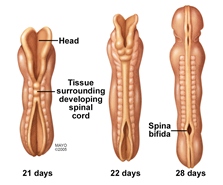-
Minnesota
Expert Alert: The Importance of Folic Acid and Prenatal Care to Prevent Birth Defects, Especially Among Hispanic Women
https://www.youtube.com/watch?v=KlXNSz6F-D0
Journalists: This animation is available in the downloads.
ROCHESTER, Minn. — Although Mayo Clinic doctors and researchers don't have a definite answer as to why spina bifida birth defects occur, they have identified a few important risk factors and two different surgery options. Risk factors include race, family history, diabetes, obesity, increased body temperature and folate deficiency.
A recent March of Dimes study on the risk of neural tube defect-affected pregnancies published in the American Journal of Public Health says, “Hispanic women are at an especially high risk of having newborns with serious birth defects.” According to this report, “more babies are born prematurely to Hispanics than women of other ethnicities in the United States making it the fastest-growing ethnic group in the country.” To help avoid birth defects, it’s mentioned that women of Mexican descent “fortifying corn masa flour with vitamin B folic acid could prevent more serious birth defects of the brain and spine,” according to the same publication.
MEDIA CONTACT:
Kelley Luckstein, Mayo Clinic Public Affairs, 507-284-5005, newsbureau@mayo.edu

According to Mayo Clinic physicians, the treatment for spina bifida depends on the severity of the condition. Performing the surgery early can help minimize risk of infection that is associated with the exposed nerves and may also help protect the spinal cord from additional trauma.
The neural tube develops early in the pregnancy and closes by the 28th day after conception. In babies with spina bifida, a portion of the neural tube fails to develop or close properly, causing defects in the spinal cord and in the bones of the backbone. There are two surgical options: The first option is usually performed within 24 to 48 hours after birth to put the meninges back in place and close the opening in the vertebrae, and the second takes place before the 26th week of pregnancy. The second procedure, called in-utero spina bifida surgery, is a rather complex procedure that requires a team of experts from many Mayo Clinic specialties. In this procedure surgeons expose a pregnant mother's uterus surgically, open the uterus and repair the baby's spinal cord.
Mayo Clinic physicians believe that nerve function in babies with spina bifida seems to worsen rapidly after birth, so it may be better to repair spina bifida defects while the baby is still in the uterus (in- utero).
“In-utero spina bifida surgery has the potential to reduce complications to the nervous system in children with spina bifida. Early referral to a specialized center offering fetal surgery is necessary to determine if the mother and baby are suitable candidates,” says Nicholas Wetjen, M.D., a Mayo Clinic Children’s Center neurosurgeon.
The American Academy of Pediatrics, in an effort to prevent birth defects, agrees with the U.S. Public Health Service that “all women capable of becoming pregnant consume 400 micrograms (mcg) per day of folic acid (B vitamin).” Also mentioned in the article is that “folic acid helps prevent neural tube defects (NTD) which include spina bifida.” Regarding that statement, Norman Davies, M.B.B.S., M.D., assistant professor of obstetrics-gynecology at Mayo Clinic, says that “genetics play a distinct and important role in these cases. Couples who've had one child with a neural tube defect have a slightly higher chance of having another baby with the same defect. Prenatal care, a healthy diet and prenatal vitamins containing folic acid are key to the baby’s development.”
###
About Mayo Clinic
Recognizing 150 years of serving humanity in 2014, Mayo Clinic is a nonprofit worldwide leader in medical care, research and education for people from all walks of life. For more information, visit 150years.mayoclinic.org, www.mayoclinic.org and newsnetwork.mayoclinic.org.







